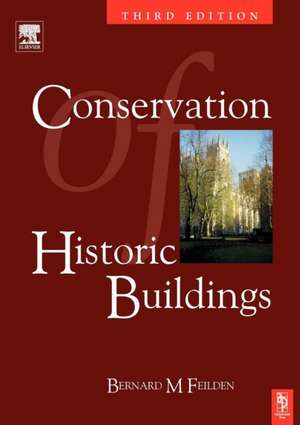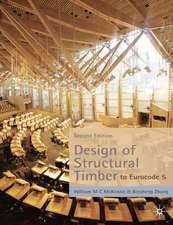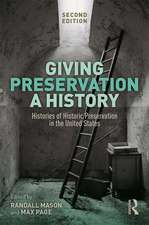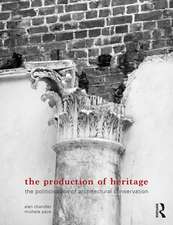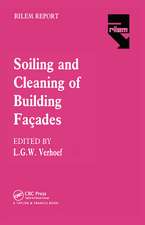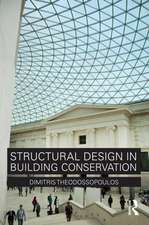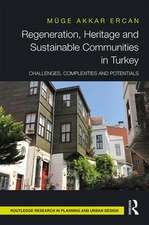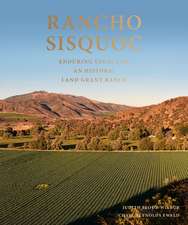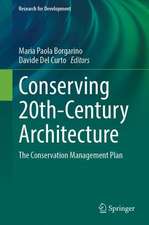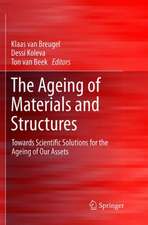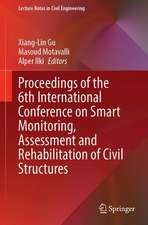Conservation of Historic Buildings
Autor Bernard Feildenen Limba Engleză Paperback – 6 iun 2003
The result of the lifetime's experience of one of the world's leading architectural conservators, the book comprehensively surveys the fundamental principles of conservation in their application to historic buildings, and provides the basic information needed by architects, engineers and surveyors for the solution of problems of architectural conservation in almost every climatic region of the world. This edition is organized into three complementary parts: in the first the structure of buildings is dealt with in detail; the second focuses attention on the causes of decay and the materials they affect; and the third considers the practical role of the architect involved in conservation and rehabilitation. As well as being essential reading for architects and others concerned with conservation, many lay people with various kinds of responsibility for historic buildings will find this clearly written, jargon-free work a fruitful source of guidance and information.
Preț: 625.13 lei
Preț vechi: 686.95 lei
-9% Nou
Puncte Express: 938
Preț estimativ în valută:
119.62€ • 127.91$ • 99.74£
119.62€ • 127.91$ • 99.74£
Carte disponibilă
Livrare economică 28 martie-11 aprilie
Livrare express 13-19 martie pentru 51.15 lei
Preluare comenzi: 021 569.72.76
Specificații
ISBN-13: 9780750658638
ISBN-10: 0750658630
Pagini: 404
Ilustrații: black & white illustrations
Dimensiuni: 210 x 280 x 23 mm
Greutate: 1.04 kg
Ediția:Revizuită
Editura: Taylor & Francis
Colecția Routledge
Locul publicării:Oxford, United Kingdom
ISBN-10: 0750658630
Pagini: 404
Ilustrații: black & white illustrations
Dimensiuni: 210 x 280 x 23 mm
Greutate: 1.04 kg
Ediția:Revizuită
Editura: Taylor & Francis
Colecția Routledge
Locul publicării:Oxford, United Kingdom
Public țintă
Conservators, architects, surveyors, conservation officers, owners of historic buildings, archaeologistsCuprins
Preface; Acknowledgements; Introduction to architectural conservation; Part 1 - Structural aspects of historic buildings; Part 2 - Causes of decay in materials and structure; Part 3 - The work of the conservation architect; Appendices; Bibliography; Index
Recenzii
Reviews of previous editions:
'There must be many well thumbed copies of the first edition of this highly regarded book on the shelves of older members of EASA because upon its first publication in 1982 it quickly established itself as a standard work of reference and information. It keeps its rightful place as a most readable and stimulating book and anyone who aspires to a professional standard of excellence in the field can hardly do without owning a copy.' - EASA Newsletter
'Bernard Feilden is a monument to conservation.'
John Fidler - The Architect's Journal
'Is it a book to buy? Definitely. It is an icon and a classic of its kind; but more importantly, it is a true working book. Students will use it to garner the essential knowledge they need, the experienced professional will use it as an aide memoire.' - ASCHB Newsletter
'There must be many well thumbed copies of the first edition of this highly regarded book on the shelves of older members of EASA because upon its first publication in 1982 it quickly established itself as a standard work of reference and information. It keeps its rightful place as a most readable and stimulating book and anyone who aspires to a professional standard of excellence in the field can hardly do without owning a copy.' - EASA Newsletter
'Bernard Feilden is a monument to conservation.'
John Fidler - The Architect's Journal
'Is it a book to buy? Definitely. It is an icon and a classic of its kind; but more importantly, it is a true working book. Students will use it to garner the essential knowledge they need, the experienced professional will use it as an aide memoire.' - ASCHB Newsletter
Descriere
Since its publication in 1982 Sir Bernard Feilden's Conservation of Historic Buildings has become the standard text for architects and others involved in the conservation of historic structures. Leading practitioners around the world have praised the book as being the most significant single volume on the subject to be published. This third edition revises and updates a classic book, including completely new sections on conservation of Modern Movement buildings and non-destructive investigation.
The result of the lifetime's experience of one of the world's leading architectural conservators, the book comprehensively surveys the fundamental principles of conservation in their application to historic buildings, and provides the basic information needed by architects, engineers and surveyors for the solution of problems of architectural conservation in almost every climatic region of the world. This edition is organized into three complementary parts: in the first the structure of buildings is dealt with in detail; the second focuses attention on the causes of decay and the materials they affect; and the third considers the practical role of the architect involved in conservation and rehabilitation. As well as being essential reading for architects and others concerned with conservation, many lay people with various kinds of responsibility for historic buildings will find this clearly written, jargon-free work a fruitful source of guidance and information.
The result of the lifetime's experience of one of the world's leading architectural conservators, the book comprehensively surveys the fundamental principles of conservation in their application to historic buildings, and provides the basic information needed by architects, engineers and surveyors for the solution of problems of architectural conservation in almost every climatic region of the world. This edition is organized into three complementary parts: in the first the structure of buildings is dealt with in detail; the second focuses attention on the causes of decay and the materials they affect; and the third considers the practical role of the architect involved in conservation and rehabilitation. As well as being essential reading for architects and others concerned with conservation, many lay people with various kinds of responsibility for historic buildings will find this clearly written, jargon-free work a fruitful source of guidance and information.
